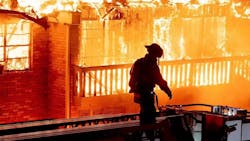In the 21st century, one of the primary challenges that affects each U.S. social and governmental institution is that of ethics.
According to Matin Katirai, who is the author of “Sprawl and Fire Department Response Times Across the United States,” which was published in Journal of Emergency Management, an increasingly diverse working environment, in combination with other factors, such as individualism within the U.S. culture itself, makes previous ethical models that are followed by various organizations outdated.
This is particularly true for fire departments that struggle to be ethically competent in the face of new challenges within the fire service sector. To varying degrees, work cultures in fire departments across the nation have become toxic, and this, Katirai writes, has led to multiple negatives that fire departments must address to remain competent in fulfilling their mission in the short and long terms.
As a student of the fire service, I am embarrassed to say that for the first 15 years of my career I wasn’t aware of the Firefighter Code of Ethics, which was developed by the National Society of Executive Fire Officers. It wasn’t until I made my first trip to the National Fire Academy that I became aware of the fire service’s written commitment to an ethical profession.
It’s important to look at the challenges and opportunities for an ethical fire department, the key characteristics and qualities for a fire department, and, lastly, how personal and professional ethics apply to firefighters, administrators and the fire chief.
Modernization’s effect on ethics
One challenge that some departments have is rooted in a lack of government oversight of fire service organizations. Such a lack of oversight and of attention toward departments can be seen as having led to a lower degree of career competitiveness because of a lower rate of compensation when compared with other governmental organizations.
For example, members of the military, which is a comparable governmental organization that’s put in harm’s way, receive compensation for hazardous tasks in the form of multiple benefits, including increased stipends and an overall higher salary. However, in recent years, multiple governments on a local, state and federal level cut the funding for fire departments despite the high rate of urbanization in the United States that requires a competent fire service.
This lack of proper funding and an increased workload have stressed departments and brought about a lower degree of ethical fire service in the nation, according to “A Study on the Revision of the Fire Safety Standard of the Fire Department Connection,” which was published in Fire Science and Engineering. The idea of consequentialism—or “the end justifies the means”—might allow the unethical behavior of inflating or deflating numbers to drive decisions and outcomes.
Another challenge that many fire service organizations face is modernization. The updating of equipment and training for firefighters can be opposed by senior officials within a department who are comfortable with the “old school” methods of firefighting.
The challenge posed by modernization is explained in the following quote from “Two Forms of Virtue Ethics: Two Sets of Virtuous Action in the Fire Service Dispute?” by David Dawson, which was published in Journal of Business Ethics: “Did the modernization initiatives as a whole pose a challenge to good firefighting? Some changes, including the move to regional joint control rooms, would reduce the ability to offer a localized service traditionally. However, improving the medical skills of firefighters was likely to benefit communities by increasing the level of service. This suggests that it is unlikely that the leadership's rejection of modernization was based solely on the satisfaction of the standards of good firefighting.”
Modernization has the potential to bring departments into the 21st century but also to cause tension between junior members and senior leadership. When implementing modernization changes, special attention should be paid to discussing and analyzing the benefits of changing from the task level to the executive level to ensure a successful work environment.
Virtue ethics
Challenges are opportunities, but only if we recognize them as such. One of the key opportunities that departments have is the multiple 21st century ethical models that can be applied practically in their agencies.
For a department to be considered ethical, a consistent framework should be implemented, and one of the most popular ethical fire department frameworks is the virtue ethics framework. It’s best defined in the following quote from Dawson’s article: “The virtue approach to ethics stresses how the virtues in a person’s character lead them to act for the good. In this, it emphasizes the person and his or her motives in acting rather than specific actions.”
Practically, there are multiple characteristics that a department could demonstrate when following this ethical framework and implementing it into its organization properly.
Foundational characteristics of an ethical department can be seen when individual members exhibit a high degree of selflessness in carrying out their duties. Selflessness, Dawson writes, can be seen when “an ethical individual should look after his or her welfare as well as the welfare of others. This gives symmetry in the relationships that the agent has with other individuals, his or her community and society. So, firefighters will pay proper regard for their welfare and safety as well as the welfare and safety of the victims.”
This virtue within the profession often is associated just with the firefighters themselves, but, in actuality, it can be applied to other members of a department, ranging from leadership to support staff. For example, through the virtue of selflessness, support staff who work for the department won’t have a problem going out of their way to help a firefighter who is in need, particularly during a stressful situation, even if it’s inconvenient for the support staff worker.
Personal and professional ethics apply in varying ways to firefighters, administrators and the fire chief. In the case of the fire chief, according to the article “A Study on the Efficient Management of Volunteer Fire Department,” which was published in Fire Science and Engineering, professional ethics is crucial in maintaining a proper level of credible leadership and management within the organization. Without these professional ethics, the fire chief loses a significant amount of respect among his/her subordinates, which prevents the fulfillment of the mission, vision and stated values of the organization.
This is different from the emphasis of ethics on firefighters and administrators, which should lean toward the personal model instead of the professional model, the article adds. By utilizing personal ethics, each of these workers can create an environment that’s conducive to the development of the organization as a whole.
Inclusivity
Ethics are an integral part of a 21st century fire department and can help to lessen the negative effects that many departments face today. With a consistent ethical framework, departments can become coalescent and create an inclusive working environment for everyone, from probationary firefighter to fire chief. The reciprocal benefit will be demonstrated by each member of the department and the community that’s served. Without this approach to ethics, departments throughout the nation will continue to decline amid higher urban populations that stress outdated ethical frameworks.
About the Author

Kristopher Blume
Kristopher T. Blume is the fire chief of the Meridian, ID, Fire Department and has more than two decades of fire service experience. He is an author, lecturer and independent consultant. Blume is a graduate of the Executive Fire Officer (EFO) program and is an instructor at the National Fire Academy. As a student of the fire service, he is focused on values-driven, mission-focused leadership for the profession. He is the author of "Carry the Fire: The Crucible of Leadership in the Fire Service".
